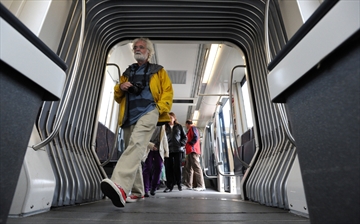GRT seems to have improved a lot since a few years ago, now that there are multiple iXpress routes.
I do want to comment though that one of the biggest benefits of LRT is that it's on its own right-of-way, it can never be slowed down by traffic since it has its own lane. However, there really is no traffic in Waterloo along the King St spine as far as I can tell. I was driving around uptown Waterloo at 5pm on a weekday and noticed the complete lack of traffic compared to Toronto. The other thing about KW is that there is tons of free parking everywhere, which takes away another incentive to use transit.
Having said that, it's probably better to build transit before traffic is a problem instead of after like Toronto has. I support the LRT due to all the reasons the PDF you posted listed, and the fact that it provides a higher quality ride to the iXpress & 7 riders, which there are a lot of. There also seems to be the trend of tech companies moving their offices to more urban areas like downtown Kitchener, although there are still many workplaces in office parks surrounded by parking lots.





